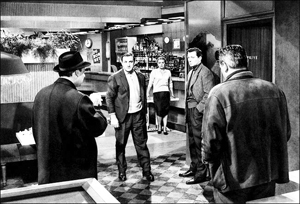Classes tous risques (1960) Criterion DVD
 Saturday, September 5, 2009 at 05:59PM
Saturday, September 5, 2009 at 05:59PM  From left, Claude Cerval, Lino Ventura, France Asselin, Amié de March and Michel Ardan in Classe Tous Risques. © Rialto Picture
From left, Claude Cerval, Lino Ventura, France Asselin, Amié de March and Michel Ardan in Classe Tous Risques. © Rialto Picture
After fighting in the Resistance during WWII, Jose Giovanni became a small-time French hood. He helped pull a small-time robbery, somebody died, and Giovanni got death row. After months awaiting the guillotine, he gained clemency and spent eight years in prison. There, he wrote. And three of his many novels-Classe tous risques, Le trou and Le Deuxiéme Souffle- were adapted into classics of hardboiled French film noir.
Le Deuxiéme Souffle, Jean-Pierre Melville’s seldom seen masterpiece, is finally out on a beautiful Criterion DVD and Le trou -a jailbreak movie without a jailbreak- became Jacques Becker’s ode to the futility of effort. Classe, based on the true story of a legendary outlaw whom Giovanni befriended on death row, is a treatise to the enduring noir trope that to live outside the law one must be honest. (And that fate will always undo your plans.)
Everything goes pear-shaped from the opening sequence, when walking Mount Rushmore Lino Venturi stages a heist on the streets of Milan with his pal Stan Krol, a charismatic French Lee Marvin who appeared in only three films. Krol was a jailhouse buddy of Giovanni’s. In the excellent, if brief, interviews included in the extras on this disc, Giovanni cites Krol’s ‘physique Americaine’; Krol provides the irresistible force to Ventura’s immovable object. There’s little point citing the millions of caper movies that copiedrisques’s opening crime, but the breath-taking vitality of its violence, it’s hair-raising chase scenes and its characters’ glee in being badass has not aged a day in forty-eight years. An animal as willful as Krol is not long for this earth, and his replacement in the loyal buddy capacity is Jean-Paul Belmondo in the last of his supporting roles before breaking huge in Godard’s Breathless.
Belmondo appears impossibly relaxed, charismatic and even shy – a complete natural slowly connecting to his own genius by staying out of its way. When he and Ventura share the frame, their stardom assumes such opposite form and expression. Ventura’s monosyllabic presence, with a capital P, gives room to Belmondo’s restlessness, and they become their characters: the embittered, unshakeable old pro and the brash, unbeatable young stud. Ventura believes only in family, whether of blood or obligation. Belmondo, determined to be worthy, serves as loyally as Venutra’s wife, pal and kids; little works out for any of them. Criterion’s print is flawless, and highlights Sautet’s stark framing and brutal high-contrast lighting. Glimmers of the oncoming Point Blank and the clearly influential Riffifi are equally apparent in Sautet’s clean, cold visuals and sparse dialogue. Sautet subsumes the noir that came before and slams a coffin lid on all its futile aspirations.
 Belmondo,
Belmondo,  Criterion,
Criterion,  Jose Giovanni,
Jose Giovanni,  Lino Ventura,
Lino Ventura,  Melville,
Melville,  Sautet
Sautet 
